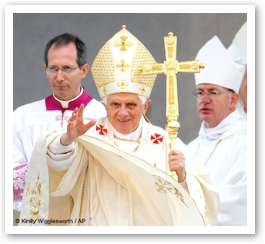What the Pope really said in Spain
- COLLEEN CARROLL CAMPBELL
From the screeching headlines and sour press reports, you would think Pope Benedict XVI's recent trip to Spain was a colossal flop.
 |
What else could you call a visit from an 83-year-old cleric who spent two straight days ranting against gays and abortion amid swarms of angry protesters? And we all know that's what happened, because the mainstream media told us so.
Never mind that little in the transcripts or live television coverage of the papal visit supported that storyline. Or that those anti-pope protests trumpeted as the trip's most newsworthy event were more minuscule than massive. The gay rights activists who staged a "kiss-in" against Benedict in Barcelona numbered about 200. The pilgrims who gathered to cheer him numbered a quarter million.
Let's not dwell on numbers. What matters are words, and according to the Associated Press, Benedict devoted his to "attacking" and "blasting" Spain's lax abortion and marriage laws.
Not explicitly, of course. Yet astute observers could detect the angry, political subtext of his Sunday homily in Barcelona's newly consecrated Basilica of the Holy Family. The AP spared readers all that papal mumbo jumbo about the beauty of faith and family and cut to the chase, saying Benedict "railed against same-sex marriage and divorce" and "criticized policies allowing for abortions."
What were the actual words that generated this synopsis of the pope's homily, one echoed in news reports across Western Europe and America? Here they are, buried in Benedict's call for more support for working families: "The generous and indissoluble love of a man and a woman is the effective context and foundation of human life in its gestation, birth, growth and natural end."
Simply put, the pope believes that faithful, lifelong, man-woman marriage is the ideal context for bearing and rearing children. His belief is buttressed by four decades of social science studies showing that children raised by their married mothers and fathers fare better than those raised in other types of families on nearly every measure available.
But enough about the research; back to Benedict's irrational rant. After reiterating Catholic teaching on the 'sacred and inviolable" dignity of human life, the pope said the Catholic Church "resists every form of denial of human life" and supports "everything that would promote the natural order in the sphere of the institution of the family."
To the untrained ear, that message sounds positive and apolitical. Yet those who interpret the pope's messages for the masses know better. They remind us, in story after story, that religious leaders who defend traditional values do so angrily, to advance political agendas and protect their power. When the facts fail to fit that template – as they almost always do in the case of gentle, smiling Benedict – they get downplayed or omitted.
There's nothing new about reporters turning measured papal statements into blaring headlines. Nor are such journalists wrong to surmise that Benedict's views challenge the prevailing secular ethos of our age. But in their frenzy to depict the pope as crotchety culture warrior, they miss the meatiest part of his challenge. |
There's nothing new about reporters turning measured papal statements into blaring headlines. Nor are such journalists wrong to surmise that Benedict's views challenge the prevailing secular ethos of our age. But in their frenzy to depict the pope as crotchety culture warrior, they miss the meatiest part of his challenge.
Benedict's fundamental critique of the secular West is not about flawed policies as much as the flawed ideology that drives them: the naïve assumption that we can remember our respect for human rights while forgetting the Judeo-Christian heritage and view of the human person that gave rise to that respect in the first place. In his quiet, erudite way, he dares us to see faith as a foundation rather than an obstacle to our freedom, to live as if the God of the Bible still matters today and to ponder what our longings for beauty and infinity tell us about our eternal destiny.
Benedict sounded these themes Sunday, in a 1,900-word homily of which only about 100 words related to the hot-button issues that received all the press.
"At a time in which man claims to be able to build his life without God, as if God had nothing to say to him," the pope said, architect Antoni Gaudí's remarkable cathedral reminds us "that the secret of authentic originality consists in returning to one's origin, which is God."
In other words, the transcendent world view of faith is more original and liberating than the materialist one championed by secular sophisticates. Those are provocative words, worthy of serious debate. Too bad skewed papal media coverage ensures that most Americans and Europeans will never hear them.
 This is Meaghen Gonzalez, Editor of CERC. I hope you appreciated this piece. We curate these articles especially for believers like you.
This is Meaghen Gonzalez, Editor of CERC. I hope you appreciated this piece. We curate these articles especially for believers like you.
Please show your appreciation by making a $3 donation. CERC is entirely reader supported.

Acknowledgement
Colleen Carroll Campbell. "What the Pope really said in Spain." St. Louis Post-Dispatch (November 11, 2010).
Reprinted with permission of the author, Colleen Carroll Campbell.
The Author
 Colleen Carroll Campbell is an author, print and broadcast journalist and former presidential speechwriter. She is the author of My Sisters the Saints: A Spiritual Memoir and The New Faithful: Why Young Adults Are Embracing Christian Orthodoxy. Her website is here.
Colleen Carroll Campbell is an author, print and broadcast journalist and former presidential speechwriter. She is the author of My Sisters the Saints: A Spiritual Memoir and The New Faithful: Why Young Adults Are Embracing Christian Orthodoxy. Her website is here.





